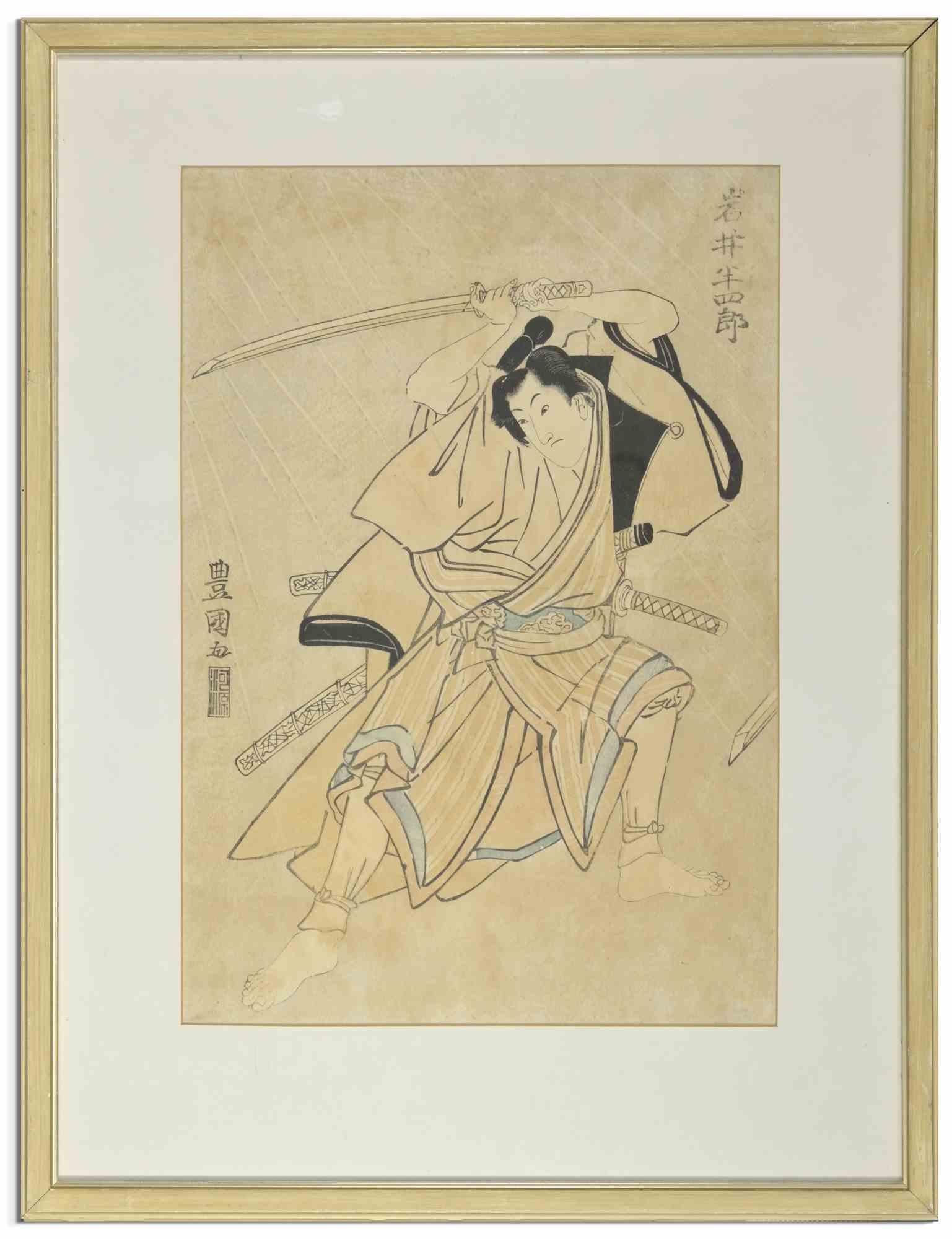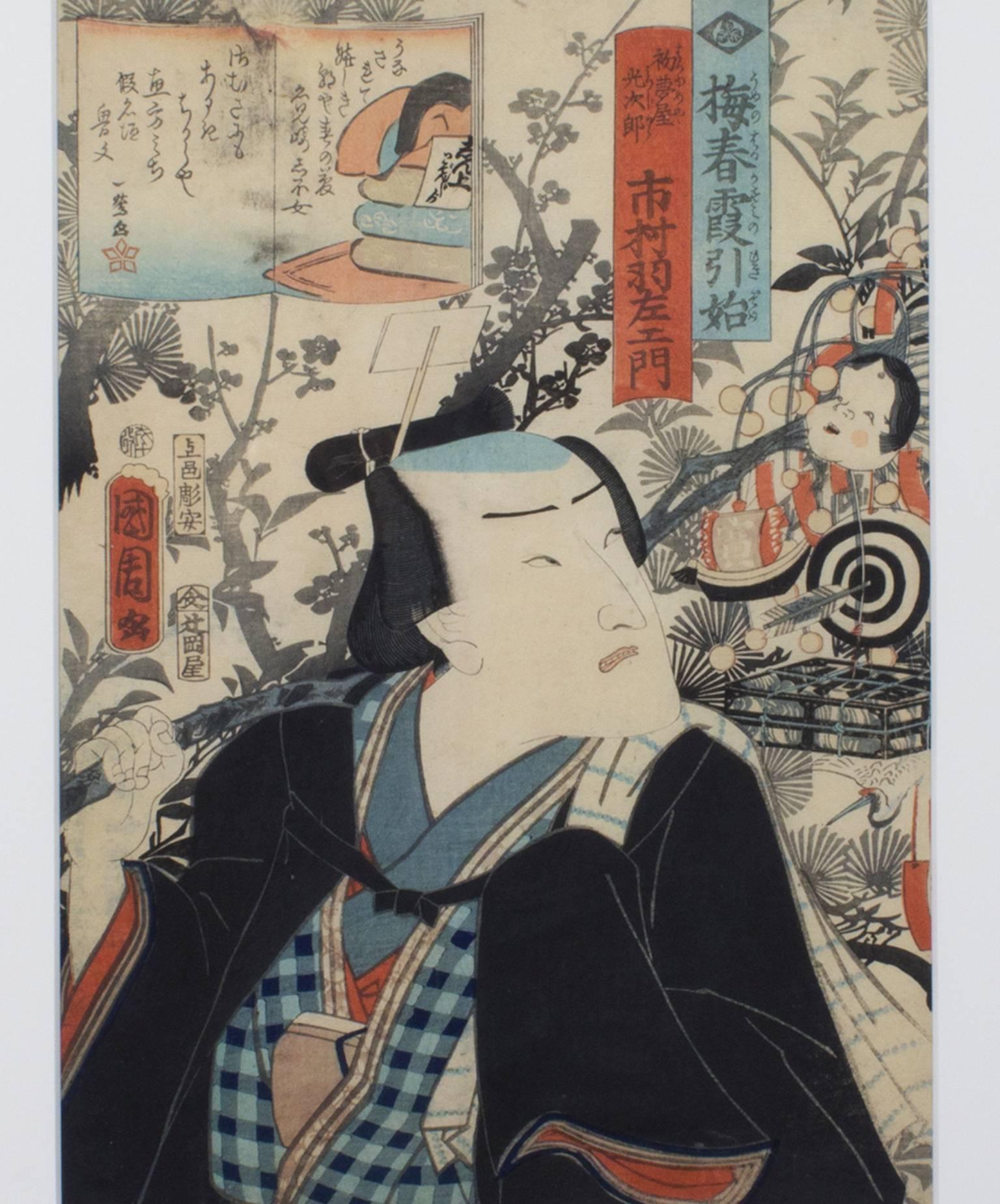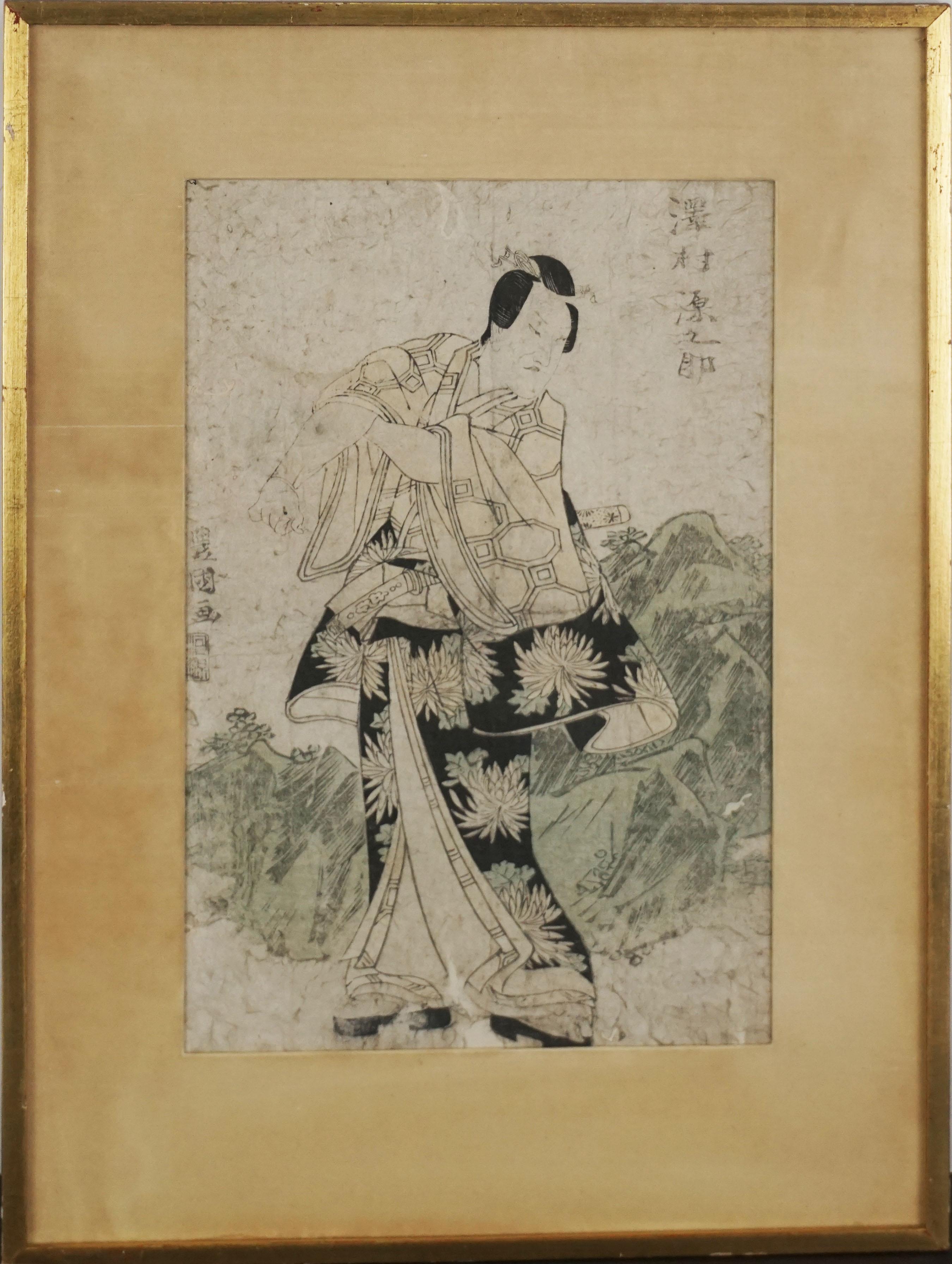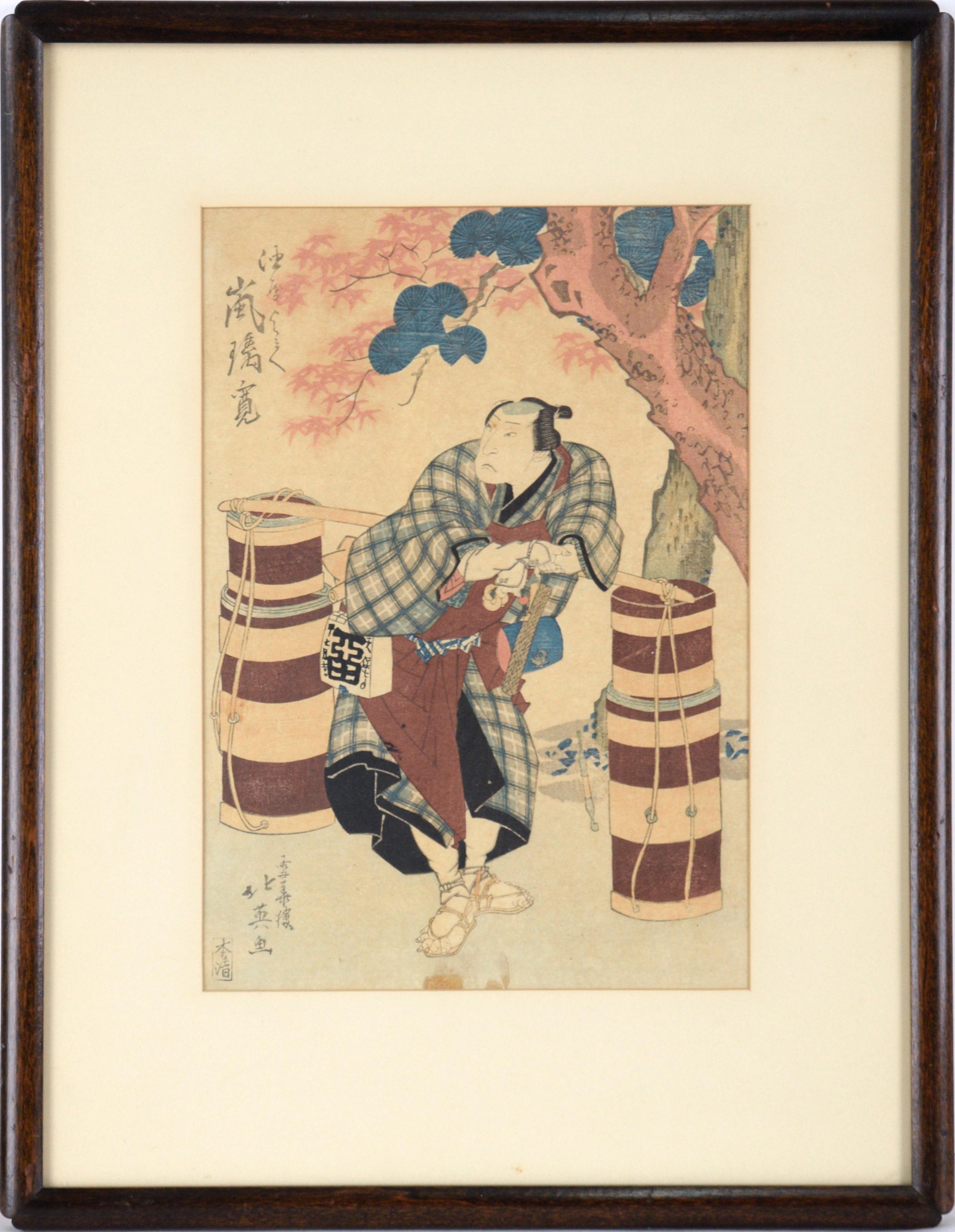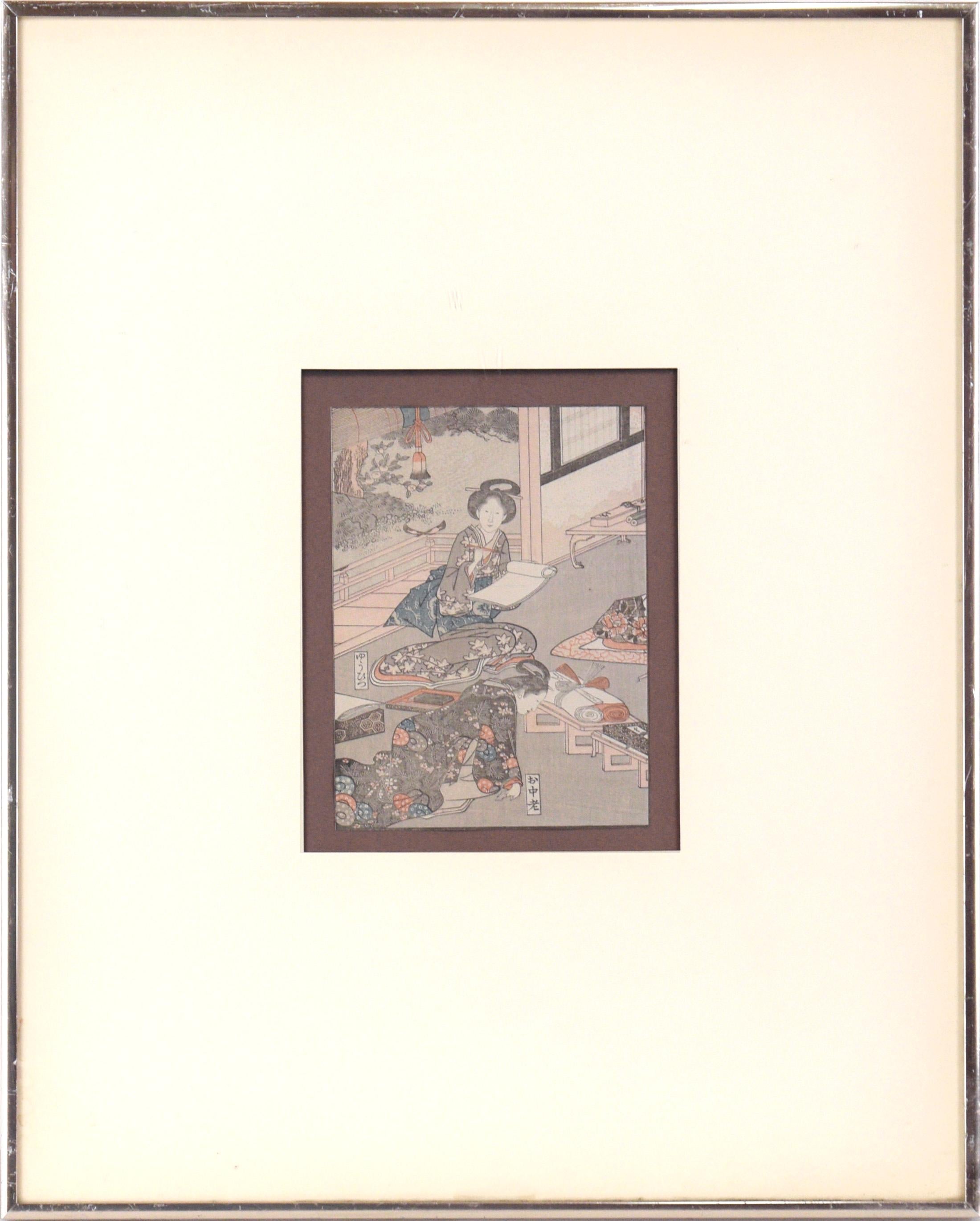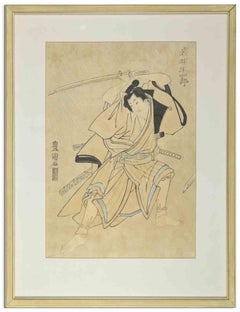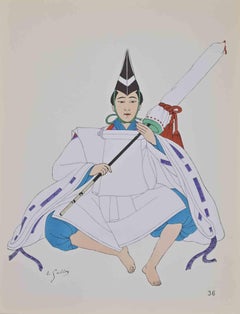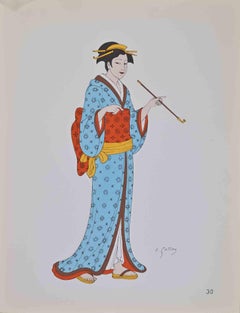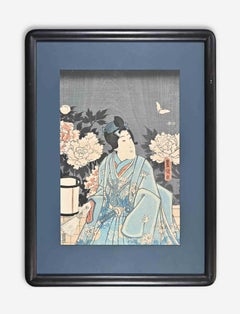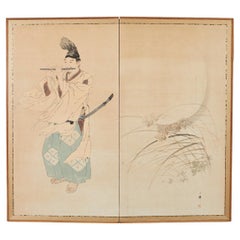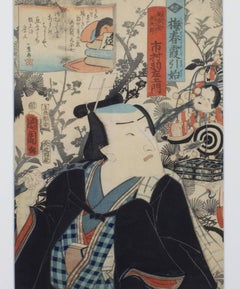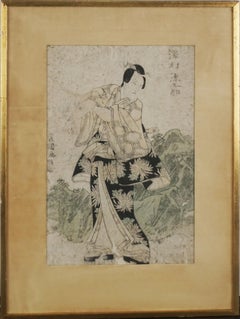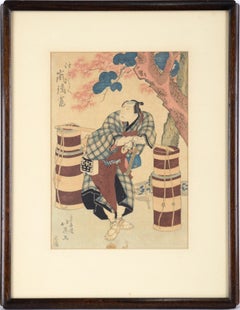Items Similar to Samurai Playing Flute - Mixed Media by Matsumura Keibun School - 1800
Want more images or videos?
Request additional images or videos from the seller
1 of 6
UnknownSamurai Playing Flute - Mixed Media by Matsumura Keibun School - 180019th Century
19th Century
$589.64
£436.54
€490
CA$816.40
A$891.31
CHF 467.28
MX$10,825.31
NOK 5,835.54
SEK 5,510.31
DKK 3,730.47
About the Item
Samurai playing the Flute is an original artwork realized in the XIX Century.
Original pencil, pastel and ink. Passepartout included. Matsumura Keibun School.
Made in Japan.
Good conditions.
Beautiful artwork representing the figure of a Samurai playing a flute in a natural place, with grass on the wind. The work is very delicate for its colors and its strokes and cames from the Matsumura Keibun School. Matsumura Keibun (1779, Kyoto -1843, Kyōto) was a Japanese painter. n 1830, he published an illustrated book; "Go Keibun gafu" which was a significant contribution to establishing Goshun's style. His style is similar to Goshun's, but somewhat lighter and what, in Western art, would be called manneristic. His best known works are a set of fusumas (sliding doors) in Myoho-Ji, which are called Shiki kōsaku-zu.
- Creation Year:19th Century
- Dimensions:Height: 11.03 in (28 cm)Width: 15.36 in (39 cm)Depth: 0.08 in (2 mm)
- Medium:
- Period:
- Condition:Insurance may be requested by customers as additional service, contact us for more information.
- Gallery Location:Roma, IT
- Reference Number:Seller: M-1039481stDibs: LU65035237261
About the Seller
4.9
Platinum Seller
Premium sellers with a 4.7+ rating and 24-hour response times
1stDibs seller since 2017
7,709 sales on 1stDibs
Typical response time: 2 hours
- ShippingRetrieving quote...Shipping from: Grasse, France
- Return Policy
Authenticity Guarantee
In the unlikely event there’s an issue with an item’s authenticity, contact us within 1 year for a full refund. DetailsMoney-Back Guarantee
If your item is not as described, is damaged in transit, or does not arrive, contact us within 7 days for a full refund. Details24-Hour Cancellation
You have a 24-hour grace period in which to reconsider your purchase, with no questions asked.Vetted Professional Sellers
Our world-class sellers must adhere to strict standards for service and quality, maintaining the integrity of our listings.Price-Match Guarantee
If you find that a seller listed the same item for a lower price elsewhere, we’ll match it.Trusted Global Delivery
Our best-in-class carrier network provides specialized shipping options worldwide, including custom delivery.More From This Seller
View AllActor Iwai Hanshiro as a Samurai by Utagawa Toyokuni I - Early 19th Century
By Utagawa Toyokuni
Located in Roma, IT
Actor Iwai Hanshiro as a Samurai is an artwork realized by Utagawa Toyokuni (1769-1825), in the early 19th Century
Color woodcut, signed or inscribed in the top right and bottom lef...
Category
Early 19th Century Modern Figurative Prints
Materials
Woodcut
Japanese Costume - Lithograph by Emile Gallois - Mid-20th Century
Located in Roma, IT
Lithograph and pochoir realized by Emile Gallois in the mid-20th Century ca. to illustrate japanese costumes.
Signed in the plate.
Published by H. Laurens, Paris.
Very good condit...
Category
Mid-20th Century Modern Figurative Prints
Materials
Lithograph
Japanese Costume - Lithograph by Emile Gallois - Mid-20th Century
Located in Roma, IT
Lithograph and pochoir realized by Emile Gallois in the mid-20th Century ca. to illustrate japanese costumes.
Signed in the plate.
Published by H. Laurens, Paris.
Very good condit...
Category
Mid-20th Century Modern Figurative Prints
Materials
Lithograph
Kabuki Actor - Woodblock Print attr. to Utagawa Kunisada - Mid-19th Century
By Utagawa Kunisada (Toyokuni III)
Located in Roma, IT
Kabuki Actor is an original Woodcut print realized in mid 19 century and attributed to Utagawa Kunisada.
Beautiful colored woodblock print, included a cardboard passpartout.
Includ...
Category
Mid-19th Century Modern Figurative Prints
Materials
Woodcut
The Japanese - Original Pencil and Sanguine Drawing - 1880s
Located in Roma, IT
The Japanese is an original modern artwork realized in 1880s by a french artist.
Original drawing realized wth black pencil and sanguine.
On the lower right corner: Musèe du Louvre...
Category
1880s Modern Figurative Drawings and Watercolors
Materials
Pencil, Color Pencil
Japanese Costume - Lithograph by Emile Gallois - Mid-20th Century
Located in Roma, IT
Lithograph and pochoir realized by Emile Gallois in the mid-20th Century ca. to illustrate japanese costumes.
Signed in the plate.
Published by H. Laurens, Paris.
Very good condit...
Category
Mid-20th Century Modern Figurative Prints
Materials
Lithograph
You May Also Like
Japanese Taisho Two Panel Screen Heian Period Flute Player
Located in Rio Vista, CA
Extraordinary Japanese Taisho period two panel byobu screen depicting Fujiwara Yasumasa playing the flute in the Ichihara Moor. Fujiwara Yasumasa (958 to 1036) was a famous Heian period...
Category
20th Century Japanese Taisho Paintings and Screens
Materials
Silk, Wood, Paper
19th century color woodcut Japanese ukiyo-e print samurai figure
By Toyoharu Kunichika
Located in Milwaukee, WI
"Ichimura Hazaemon as Hatsuyumeya Mitsujiro" is a woodcut print by Toyoharu Kunichika in red, blue, and black.
14" x 9 1/2" art
20 3/4" x 16 3/4" framed
From the series “First Per...
Category
1860s Edo Figurative Prints
Materials
Woodcut
Kabuki Actor in Water Lily Robe with Samurai Sword - Japanese Woodblock Print
By Utagawa Toyokuni
Located in Soquel, CA
Kabuki Actor in Water Lily Robe with Samurai Sword- Japanese Woodblock Print
Finely detailed woodblock by Utagawa Toyokuni (Japanese, 1769-1825). A kabuki actor ("Master Haranyuki Sawamura") is standing on stage with mountainous backdrop, wearing a robe in a water lily pattern. He is wearing a samurai sword.
Presented in a gold colored frame with a silk mat.
Frame size: 20"H x 14.25"W
Image size: 14"H x 9"W
Utagawa Toyokuni (Japanese, 1769-1825) was born in Edo, the son of Kurahashi Gorobei, a carver of dolls and puppets...
Category
Early 19th Century Edo Figurative Prints
Materials
Ink, Rice Paper, Woodcut
Actor Arashi Rikan II as Aburaya Yohei - Figurative Woodblock Print on Paper
Located in Soquel, CA
Actor Arashi Rikan II as Aburaya Yohei - Figurative Woodblock Print on Paper
Woodblock print of kabuki actor by Shunbaisai Hokuei (Japanes...
Category
1830s Edo Figurative Prints
Materials
Paper, Ink, Woodcut
Scribe and Personal Assistant to the Shogun - Japanese Woodblock Print on Paper
Located in Soquel, CA
Scribe and Personal Assistant to the Shogun - Japanese Woodblock Print on Paper
Detailed woodblock print by an unknown artist, In the style of Suzuki Harunobu. There are two women i...
Category
19th Century Edo Figurative Prints
Materials
Paper, Ink, Woodcut
$920 Sale Price
20% Off
Japanese Art Ukiyo-e Figurative Painting, Hanazuma of the Hyôgaya House
Located in Segovia, ES
Hanazuma, a beautiful high-class courtesan of the Hyôgaya House, appears sitting sideways on her legs, twisting a letter between her hands at the height of her heart. It is perhaps its message that makes her throw her head back with a beautiful turn of her entire body allowing us to contemplate the frontal details of her kimono and her obi, in green and orange, with beautiful ornaments.
This image is part of the “bijin-ga” series (Pretty women) drawn by Mario BGil, based in the Kitigawa Utamaro woodblock print “Hanazuma of the Hyôgaya House”, (1794), 38,8 x 25,9 cm. The Japan Ukiyo-e Museum. Matsumoto, Japan.
The artist reproduces the seal of the censor (Kiwame) and from the original publisher (“Tsutaya”, climbing leaf)), between the two, the signature of Mario BGil written in Japanese, with the date 14 (2014).
The mesaurements of the drawing are 76 x 56 cm. (29,92 x 22,05 in.), with a painted surface of 67 x 49,5 cm.
With his work on the bijing-ga series, Mario BGil wanted to embellish, give brilliance and volume to the images presented by japanese artist Kitigawa Utamaro in those beautiful engravings, ennobled with the patina of time, which have served as inspiration. The result obtained is almost life-size portraits, endowed with strong chromaticism and valuable contrasts, all enhanced, in turn, with the volume provided by the weight and rigidity of the paper, and its thick texture (Fabriano Artistico “grana grosso”, 640g/m2; the thickness and hardness of the paper makes it necessary to transport it without rolling).
In this way, Mario BGil pays tribute to his admired artist and offers us a new and enriched vision of this popular facet of oriental art from the 18th and 19th centuries.
ABOUT THE ARTIST
Mario BGil is a self-taught artist who for years has combined his creative activity with his work in the business world, away from commercial art galleries. Man of very diverse interests and great artistic sensitivity, studied Art History and in 2012, a deep interest in oriental art was awakened in him so that he began to study the great masters of Japanese Ukiyo-e prints, who had such an influence on the European avant-garde of the late 19th century.
The discovery of Kitagawa Utamaro (1753-1806), a key figure in the metropolitan culture of Edo (now Tokyo), and a point of reference in the history of Japanese engraving...
Category
2010s Edo Figurative Drawings and Watercolors
Materials
Paper, Crayon, Oil Crayon, Graphite

